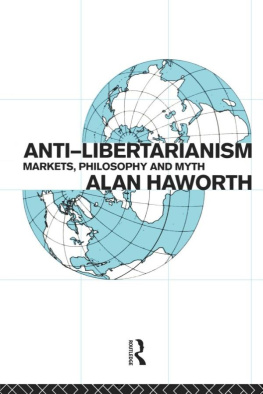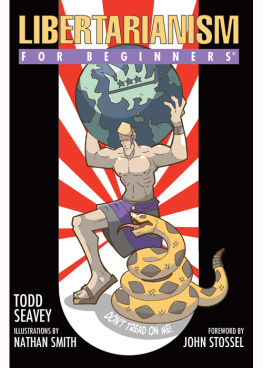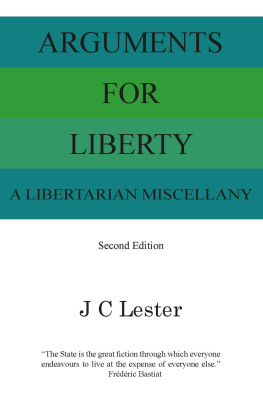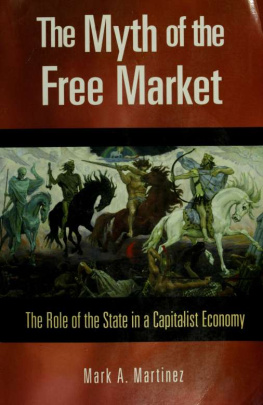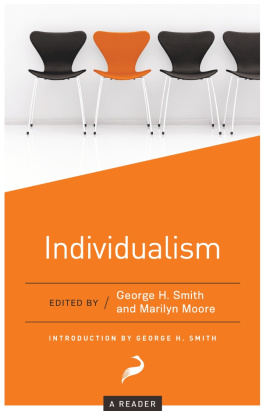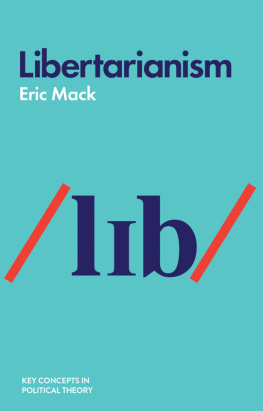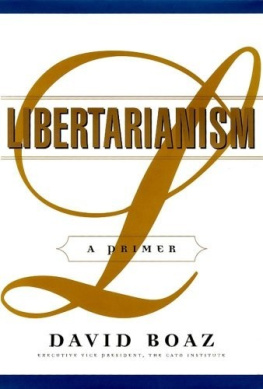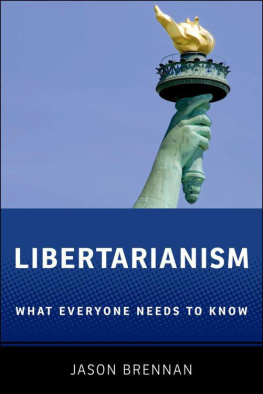Anti-libertarianism
Markets, philosophy and myth
Alan Haworth
London and New York
1994
First published 1994 by Routledge
11 New Fetter Lane, London EC4P 4EE
Simultaneously published in the USA and Canada by Routledge
29 West 35th Street, New York, NY 10001
This edition published in the Taylor & Francis e-Library, 2006.
1994 Alan Haworth
British Library Cataloguing in Publication Data
A catalogue record for this book is available from the British Library
ISBN 0-415-08253-6 (hb) ISBN 0-415-08254-4 (pb)
Library of Congress Cataloging in Publication Data
Haworth, Alan, 1944
Anti-libertarianism : markets, philosophy and myth / Alan Haworth.
p. cm.
Includes bibliographical references and index.
ISBN 0-203-00371-3 Master e-book ISBN
ISBN 0-203-30897-2 (OEB Format)
ISBN 0-415-08253-6 (hb). ISBN 0-415-08254-4 (pb)
1. Libertarianism. I. Title.
HB95.H385 1994 9337964
330. 126 dc20 CIP
Anti-libertarianism
Advocates of the free market claim that it is the only economic mechanism capable of respecting and furthering human freedom. Socialism, they say, has been thoroughly discredited. Most libertarians treat the state in anything other than its minimal, nightwatchman form as a repressive embodiment of evil. Some reject the state altogether.
But is the free market idea a rationally defensible belief? Or have its proponents failed to examine the philosophical roots of their so-called freedom? Anti-libertarianism reconsiders the theoretical libertarian stance, starting with an analysis of the model of mutually beneficial exchanges which is at the core of libertarian thinking. Alan Haworths book is a sceptical exploration of the concepts and arguments which form the tenets of free market politics. He offers the view that libertarianism is little more than an unfounded, quasi-religious statement of faith: a market romance. Moreover, libertarianism is exposed as profoundly antithetical to the very freedom which it purports to advance.
This controversial book is for anyone interested in the cultural and political impact of free market policies on the modern world. It will be useful to students and specialists of political and economic theory, social science and philosophy.
Alan Haworth is Senior Lecturer in Philosophy at the University of North London.
For my father; for Rowan; for Matthew
Contents
Preface and acknowledgements
I wrote this with my friends more than anyone else in mind. Like most intelligent people, they have been variously bewildered, puzzled, intrigued, discouraged, disaffected, changed around and moved about thanks to the dominance in our public life of the notion that there is something noble about something or other usually referred to as the free market I hope they like the book, and that they will share my belief that, if you re going to cut some sinister thing down to size, the first thing you have to do is analyse and anatomise.
Otherwise, there isnt a great deal to say by way of preface that wouldnt just repeat what I say in the opening chapter; so let me just warmly thank all the individuals who have been so supportive over the last year while I have been writing. Unfortunately, there isnt space to mention everyone by name, but the following definitely deserve mention here.
There are first my professional colleagues at the University of North London. I owe a special debt of gratitude to the members of the Research and Staff Development Committee (Faculty of Humanities and Teacher Education) who decided to award me the relief from teaching without which it would have been impossible to complete the book on time. Let me add because I know that it is conventional and expected for the recipients of such awards to acknowledge them in the way I just have that I mean that more than formally. I am deeply appreciative, and I realise how difficult it is for such committees to reach decisions in these straitened times. I am similarly appreciative of the way my colleagues, mainly my fellow philosophy teachers but also many others within the faculty, have supported me informally. I know that everyone has gone to great lengths to make sure that I have had the time to write. And, while I m on the subject, I would like to thank the students, present and past, with whom Ive had the pleasure of sharing my classes on political philosophy. I wonder who has learnt most from whom, and I count myself very lucky to have spent the greater part of my working life in such an interesting environment.
Second, there are friends and family to thank. If I were to try to mention everyone, I might miss someone out. Therefore, I shall mention no one by name except, that is, for Rowan, to whom I am especially grateful for her having assumed the role of live-in domestic engineer and child psychologist on a one-to-one basis over the last few weeks of writing. I guess that this sort of thing doesnt come too easily to a committed feminist.
Third, I am indebted to David Lloyd-Thomas and Andrew Wright, each of whom took the trouble to go through an earlier draft and make comments, despite the fact that they are both extremely busy people. It is impossible to express just how helpful I found this. I am sure that the book is much better than it would have been had it not been for the careful attention they paid it. I should add as is usual that the responsibility for remaining mistakes and infelicities remains entirely my own. Finally, I should like to thank Leigh Wilson of Routledge for her helpful comments and suggestions.
Alan Haworth
University of North London
A NOTE ON REFERENCING
I have used the Harvard system, even where I refer to passages in Lockes Second Treatise and Wittgensteins PhilosophicalInvestigations. In these cases it is customary to reference differently, by directing the reader to paragraphs noted in a certain way in the original manuscripts. However, I have thought it better to employ a standard practice throughout.
Part I
The struggle of man against power is the struggle of memory against forgetting.
Milan Kundera, The Book of Laughter and Forgetting
The work of the philosopher consists in assembling reminders for a particular purpose.
Ludwig Wittgenstein, Philosophical Investigations
Chapter 1
Libertarianism - anti-libertarianism
Libertarianism is a word with two meanings. In the earlier of the two it refers, exactly as one might expect, to any body of attitudes or ideas in which central importance is attached to freedom. In that sense of libertarian, the arguments of this book are libertarian. More recently, however, the word has come to refer to something altogether different and more specific, namely a certain assertively right-wing, pro-free market philosophy. This books subject is libertarianism in the second sense. Its aim is to outline that doctrine's main arguments and to expose its shaky structure to public view. This book is thus and in the latter sense of libertarian anti-libertarian.
Libertarians (of the second sort) maintain three central theses. First, as indicated, they maintain that the market (or free market) is good. Indeed, libertarians of this sort make enormous claims on behalf of the free market, the very least of these and the most apparently pragmatic being that the market is the distributive mechanism which ensures the satisfaction of needs and preferences most effectively. For most libertarians of this type, though, the market is more than that much more. It is the nearest thing there is to the realisation of the perfect moral order on Earth. (I do not exaggerate.) Second, libertarians (of the sort who form the subject of this book) hold that the state except in its minimal or nightwatchman form, if that is evil. Third, as its chosen

